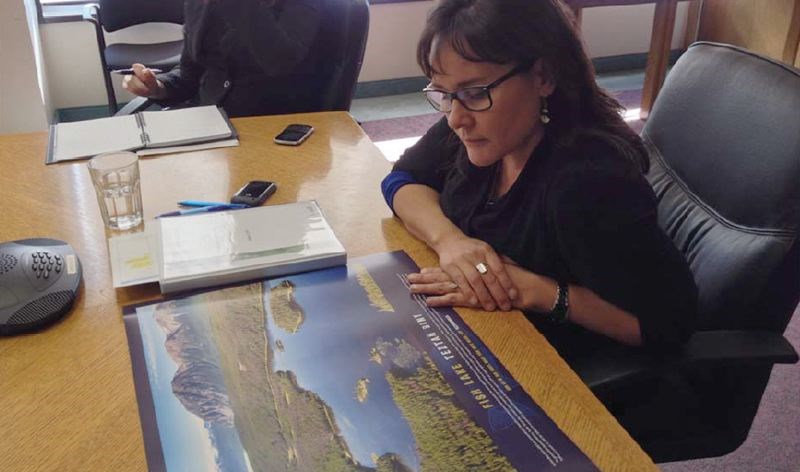Taseko Mines alleges federal politicians and bureaucrats held inappropriate meetings with First Nations leaders prior to rejecting the proposed New Prosperity copper and gold mine.
In court documents filed Wednesday, the Vancouver-based mining company said principles of natural justice weren't followed because federal Environment Minister Leona Aglukkaq and other officials met with members of the Tsilhqot'in National Government in October, prior to a federal environmental assessment panel releasing a report critical of the mine. The company said First Nations leaders held further meetings with government politicians in February prior to cabinet's ultimate rejection of the project.
"The decision-making process goes right through the panel process to the minister and in our case to the governor in council, the cabinet," Taseko vice-president of corporate affairs Brian Battison said.
"In each of those steps we were owed a duty of fairness and that duty of fairness was failed to be delivered."
Last fall a federal panel issued a report which said the mine, proposed to be built near Fish Lake, had the potential to cause adverse environmental effects on fish and fish habitat as well as harm traditional First Nations activities in the area.
Last month the federal cabinet formally rejected the mine plan based on those environmental concerns, but invited Taseko to reapply with a new plan. Taseko's first attempt to get a mine approved on the site was rejected by the federal government in 2010.
Taseko used Facebook posts from Xeni Gwet'in Chief Roger William to prove that he and other leaders met with Aglukkaq on Oct. 8 and Canadian Environmental Assessment Agency president Ron Hallman on Oct. 9. Then on Feb. 13 Taseko pointed to meetings between First Nations leaders and MP Colin Carrie, the parliamentary secretary to Aglukkaq.
In all of those cases, Taseko said it was never given the ability to respond to what First Nations raised during those meetings.
"It was understood by us that for us to have asked for, or be granted those kinds of meetings would have been inappropriate," Battison said.
Those meetings, along with errors the company believes the panel made in evidence; problems the company has identified with federal environmental assessment legislation and the federal government's decision not to provide reasons for its rejection of the mine form the basis of its legal challenge.
Taseko is asking the federal court to quash both Aglukkaq's determination that the mine could pose significant adverse effects as well as cabinet's decision to reject the mine. It's also challenging three sections of the CEAA 2012 Act, which it said gives the government the power to reject natural resource projects for reasons beyond what it is constitutionally allowed to do.
If the court agrees with Taseko, the federal cabinet would then have to reconsider its final decision about the mine.
Tsilhqot'in National Government chief Joe Alphonse said he was at all of the meetings Taseko mentions, but said there was nothing wrong with First Nations leaders sitting down with federal politicians and bureaucrats.
"We have nothing to hide, we went there we met with those people," he said.
"Is there such a law that you can't do that?"
Alphonse pointed to meetings that pro-mine advocates had with federal leaders during the same time period as evidence both sides got their message out. Provincial Energy and Mines Minister Bill Bennett met with cabinet ministers in Ottawa earlier this year, while the grassroots Say Yes to Prosperity groups met with low-level government officials.
Say Yes to Prosperity member Len Doucette said his group of local business and political leaders from the Cariboo didn't co-ordinate with Taseko in advance of its trip to Ottawa.
"When we went to Ottawa we didn't represent Taseko, we represented the community," he said.
"We did this all on our own, completely. All of the costs incurred came out of our back pockets."
From his point of view, the fact that some First Nations leaders got to meet with cabinet, but his group was relegated to sitting down with parliamentary secretaries shows that "there are two sets of rules."
While they did meet with Aglukkaq and others, Alphonse said he and other leaders actually felt disheartened after those meetings and believed the the pro-mining lobby had a strong influence in the political process.
"It's the most pro-industry government we've ever had in the history of Canada and they've turned this project down twice," he said.
This is the second judicial review Taseko has filed regarding New Prosperity in the last four months. The first was launched in November and challenged the findings of the review panel. In that case the company said that the panel used an incorrect design of the tailings pond to calculate seepage rates and didn't follow procedural fairness rules.
"The plan that we put forward to save Fish Lake was solid and fully adequate to meet the test of the environmental assessment process and the project should be approved," Battison said.
"The government was led astray by a bad process and they made the wrong decision because of that bad process and that must be corrected and that is what we're seeking to correct."
The first review has been going through preliminary processes and and Battison expects a formal hearing as early as this summer. The second review launched Wednesday is expected to run in a parallel manner.
Alphonse said he's confident the courts will hold up his contention that the mine is not environmentally safe.
"I had a look at [Taseko's] argument on paper and my interpretation is they don't have anything," he said of the first judicial review.
"I'm not overly concerned about the legal challenge they're putting forward."



